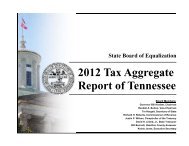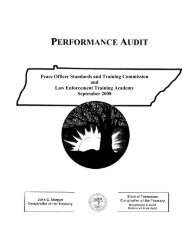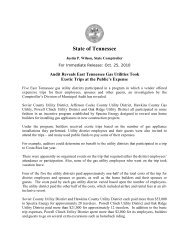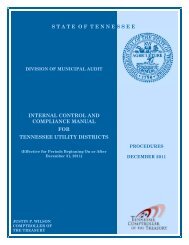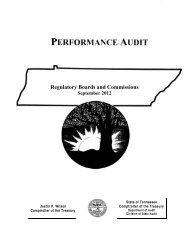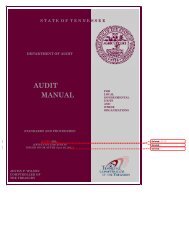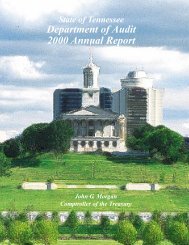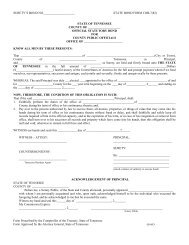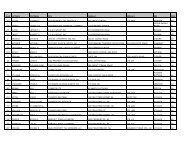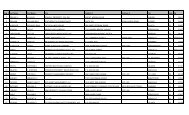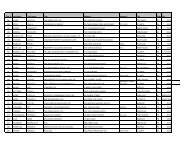On 06/30/2013 the Audit Manual was updated. For a markup copy ...
On 06/30/2013 the Audit Manual was updated. For a markup copy ...
On 06/30/2013 the Audit Manual was updated. For a markup copy ...
You also want an ePaper? Increase the reach of your titles
YUMPU automatically turns print PDFs into web optimized ePapers that Google loves.
Reporting and <strong>Audit</strong>ing Requirements – Special Purpose Governments - Section D<br />
Public Utility Districts<br />
Background<br />
Public utility districts in Tennessee are created under <strong>the</strong> authority of Title 7, Chapter 82,<br />
Tennessee Code Annotated, <strong>the</strong> Utility District Law of 1937. Utility districts created under this<br />
chapter are empowered to operate and maintain a system for furnishing any of <strong>the</strong> following:<br />
water, sewer, sewage disposal, natural gas, police, fire protection, garbage collection and<br />
garbage disposal, street lighting, parks and recreational facilities, transit facilities, community<br />
antenna television service, and transmission of industrial chemicals by pipeline to or from<br />
industries or plants within <strong>the</strong> boundary of <strong>the</strong> district. (GO TO SELECTED LAWS –<br />
APPENDIX D)<br />
Although this law empowers a public utility district to furnish any of <strong>the</strong> above, most districts<br />
confine <strong>the</strong>ir services to furnishing water and/or sewer, or natural gas.<br />
Financial Reporting<br />
General<br />
Public utility districts maintain <strong>the</strong>ir accounting systems on <strong>the</strong> accrual basis, with <strong>the</strong><br />
exception that revenue from utility sales may be recognized when billed. This method is<br />
widely accepted because of <strong>the</strong> difficulty in measuring utility services sold before <strong>the</strong> audit cutoff<br />
date. The amount of revenue earned and not recognized at year-end will be offset by <strong>the</strong><br />
amount carried forward from <strong>the</strong> preceding year, and any net difference is generally minor.<br />
The basic financial statements of all utility districts should comply with <strong>the</strong> provisions of <strong>the</strong><br />
Governmental Accounting Standards Board, as detailed in <strong>the</strong> Codification of Governmental<br />
Accounting and Financial Reporting Standards. Accounting procedures applicable to utility<br />
districts are set forth in <strong>the</strong> Uniform Accounting <strong>Manual</strong> for Tennessee Utility Districts<br />
published by <strong>the</strong> Comptroller of <strong>the</strong> Treasury. Additional guidelines can be found in <strong>the</strong><br />
Government Finance Officers Association’s 200512 Governmental Accounting, <strong>Audit</strong>ing, and<br />
Financial Reporting, commonly known as <strong>the</strong> Blue Book.<br />
Additional Requirements of <strong>the</strong> Comptroller’s Office<br />
1. An opinion on whe<strong>the</strong>r <strong>the</strong> accompanying information is fairly stated in all<br />
material respects in relation to <strong>the</strong> basic financial statements taken as a whole is<br />
preferred for ALL supplementary information. However, at a minimum any<br />
combining and individual financial statements, <strong>the</strong> utility detail required by item<br />
6 below, and <strong>the</strong> Schedule of Expenditures of Federal Awards and State<br />
Financial Assistance must be opined on in relation to <strong>the</strong> basic financial<br />
statements.<br />
2. A Schedule of Expenditures of Federal Awards and State Financial Assistance.<br />
(This schedule is required if <strong>the</strong> organization has expended any direct federal<br />
assistance or subrecipient funds, regardless of <strong>the</strong> amount expended. Assistance<br />
D-3



